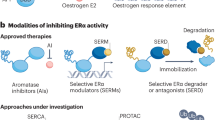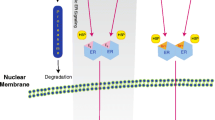Abstract
Many estrogen receptor-positive breast cancer patients initially respond to treatment with antihormonal agents such as tamoxifen, but remissions are often followed by acquisition of resistance and ultimately disease relapse. The development of a rationale for the effective treatment of tamoxifen-resistant breast cancer requires an understanding of the complex signal transduction mechanisms that contribute towards loss of antiestrogen response. Interactions between estrogen and growth factor signaling pathways have been identified in estrogen-responsive cells that are thought to reinforce their individual cellular effects on growth and gene responses. Increasing evidence indicates that abnormalities occurring in growth factor signaling pathways, notably the epidermal growth factor receptor (EGFR) signaling pathway, could dramatically influence steroid hormone action and may be critical to antihormonal-resistant breast cancer cell growth. Thus, inhibitory agents targeting growth factor receptors, or their intracellular pathway components, may prove clinically beneficial in antihormone refractory disease. One example, gefitinib ('Iressa', ZD1839), an EGFR-tyrosine kinase inhibitor, is an interesting therapeutic option that may provide benefit in the treatment of antihormonal-resistant breast cancer. Rapid progress with pharmacological and molecular therapeutic agents is now being made. Therapies that target growth factor signaling pathways may prevent development of resistance.
Similar content being viewed by others
References
Nicholson RI, Hutcheson IR, Harper ME, Knowlden JM, Barrow D, McClelland RA, Jones HE, Wakeling AE, Gee JM: Modulation of epidermal growth factor receptor in endocrineresistant, oestrogen receptor-positive breast cancer. Endocr Relat Cancer 8: 175-182, 2001
Nicholson RI, Gee JM: Oestrogen and growth factor cross-talk and endocrine insensitivity and acquired resistance in breast cancer. Br J Cancer 82: 501-513, 2000
Nicholson RI, McClelland RA, Robertson JF, Gee JM: Involvement of steroid hormone and growth factor cross-talk in endocrine response in breast cancer. Endocr Relat Cancer 6: 373-387, 1999
Hanahan D, Weinberg RA: The hallmarks of cancer. Cell 100: 57-70, 2000
Richards RG, DiAugustine RP, Petrusz P, Clark GC, Sebastian J: Estradiol stimulates tyrosine phosphorylation of the insulinlike growth factor-1 receptor and insulin receptor substrate-1 in the uterus. Proc Natl Acad Sci USA 93: 12002-12007, 1996
Dupont J, Karas M, LeRoith D: The potentiation of estrogen on insulin-like growth factor I action in MCF-7 human breast cancer cells includes cell cycle components. J Biol Chem 275: 35893-35901, 2000
Chrysogelos SA, Yarden RI, Lauber AH, Murphy JM: Mechanisms of EGF receptor regulation in breast cancer cells. Breast Cancer Res Treat 31: 227-236, 1994
Dati C, Antoniotti S, Taverna D, Perroteau I, De Bortoli M: Inhibition of c-erbB-2 oncogene expression by estrogens in human breast cancer cells. Oncogene 5: 1001-1006, 1990
Yarden RI, Lauber AH, El Ashry D, Chrysogelos SA: Bimodal regulation of epidermal growth factor receptor by estrogen in breast cancer cells. Endocrinology 137: 2739-2747, 1996
Nicholson RI, Gee JM, Francis AB, Manning DL, Wakeling AE, Katzenellenbogen BS: Observations arising from the use of pure antioestrogens on oestrogen-responsive (MCF-7) and oestrogen growth-independent (K3) human breast cancer cells. Endocr Relat Cancer 2: 115-121, 1995
McClelland RA, Barrow D, Madden TA, Dutkowski CM, Pamment J, Knowlden JM, Gee JM, Nicholson RI: Enhanced epidermal growth factor receptor signaling in MCF7 breast cancer cells after long-term culture in the presence of the pure antiestrogen ICI 182,780 (Faslodex). Endocrinology 142: 2776-2788, 2001
Gee JM, Hutcheson IR, Knowlden JM, Barrow D, Harper ME, Jones HE, Wakeling AE, Nicholson RI: The EGFR-selective tyrosine kinase inhibitor ZD1839 ('Iressa') is an effective inhibitor of tamoxifen-resistant breast cancer growth. Eur J Cancer 37(Suppl. 6): S261, 2001 (abstract 969)
Negoro S, Nakagawa K, Fukuoka M, Kudoh S, Tamura T, Yoshimura N, Takeda K, Tanigawara Y, Swaisland H: Final results of a phase I intermittent dose-escalation trial of ZD1839 ('Iressa') in Japanese patients with various solid tumours. Proc Am Soc Clin Oncol 20: 324A, 2001 (abstract 1292)
Baselga J, Rischin D, Ranson M, Calvert H, Raymond E, Kieback DG, Kaye SB, Gianni L, Harris A, Bjork T, Averbuch SD, Feyereislova A, Swaisland H, Rojo F, Albanell J: Phase I safety, pharmacokinetic, and pharmacodynamic trial of ZD1839, a selective oral epidermal growth factor receptor tyrosine kinase inhibitor, in patients with five selected solid tumor types. J Clin Oncol 20: 4292-4302, 2002
Ranson M, Hammond LA, Ferry D, Kris M, Tullo A, Murray PI, Miler V, Averbuch S, Ochs J, Morris C, Feyereislova A, Swaisland H, Rowinsky EK: ZD1839, a selective oral epidermal growth factor receptor-tyrosine kinase inhibitor, is well tolerated and active in patients with solid, malignant tumors: results of a phase I trial. J Clin Oncol 20: 2240-2250, 2002
Herbst RS, Maddox AM, Rothenberg ML, Small EJ, Rubin EH, Baselga J, Rojo F, HongWK, Swaisland H, Averbuch SD, Ochs J, LoRusso PM: Selective oral epidermal growth factor receptor tyrosine kinase inhibitor ZD1839 is generally welltolerated and has activity in non-small-cell lung cancer and other solid tumors: results of a phase I trial. J Clin Oncol 20: 3815-3825, 2002
Robertson JFR, Gutteridge E, Cheung KL, Owers R, Koehler M, Hamilton L: A Phase II study of ZD1839 ('Iressa') in tamoxifen-resistant ER-positive and endocrine insensitive (ER-negative) breast cancer. Breast Cancer Res Treat 76 (Suppl. 1): S96, 2002 (abstract 357)
Ciardiello F, Caputo R, Bianco R, Damiano V, Fontanini G, Cuccato S, De Placido S, Bianco AR, Tortora G: Inhibition of growth factor production and angiogenesis in human cancer cells by ZD1839 (Iressa), a selective epidermal growth factor receptor tyrosine kinase inhibitor. Clin Cancer Res 7: 1459-1465, 2001
Nicholson RI, Harper ME, Hutcheson IR, Madden TA, Barrow D, Knowlden JM, Jordan N, Wakeling AE, Gee JM: ZD1839 ('Iressa') improves the antitumor activity of tamoxifen ('Nolvadex') in anti-hormone responsive breast cancer cells. Proc AACR-NCI-EORTC 114, 2001 (abstract 557)
Wakeling AE, Nicholson RI, Gee JM: Prospects for combining hormonal and nonhormonal growth factor inhibition. Clin Cancer Res 7(Suppl.): 4350s-4355s, 2001
Massarweh S, Shou J, Mohsin SK, Ge M, Wakeling AE, Osborne CK, Schiff R: Inhibition of epidermal growth factor/HER2 receptor signaling using ZD1839 ('Iressa') restores tamoxifen sensitivity and delays resistance to estrogen deprivation in HER2-overexpressing breast tumors. Proc Am Soc Clin Oncol 21: 33A, 2002 (abstract 130)
Author information
Authors and Affiliations
Rights and permissions
About this article
Cite this article
Nicholson, R.I., Gee, J.M., Knowlden, J. et al. The Biology of Antihormone Failure in Breast Cancer. Breast Cancer Res Treat 80 (Suppl 1), 29–34 (2003). https://doi.org/10.1023/A:1025467500433
Issue Date:
DOI: https://doi.org/10.1023/A:1025467500433




